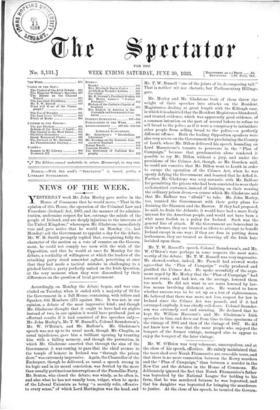Accordingly, on Monday the debate began, and was con- cluded
on Tuesday, when it ended with a majority of 93 for the Government in a full House, containing, with tellers and Speaker, 644 Members (273 against 36o). It was not, in our opinion, a debate of the most impressive kind ; and though Mr. Gladstone thought that it ought to have had six nights instead of two, in our opinion it would have produced just as effectual results if it had consisted of five speeches only,— Mr. John Morley's, Mr. T. W. Russell's, Colonel Saunderson's, Mr. W. O'Biien'a, and Mr. Balfour's. Mr. Gladstone's speech was not up to its usual mark, though Mr. Chaplin, as usual injudicious, gave him a brilliant opening by taunting him with a failing memory, and though the peroration, in which Mr. Gladstone asserted that through the sins of the Government it was coming to pass that the chief avenue to the temple of honour in Ireland was "through the prison door," was extremely impressive. Again, the Chancellor of the Exchequer, though he delivered, as usual, a speech strong in its logic and in its moral conviction, was fretted by the more than usually pertinacious interruptions of the Parnellite Party. Mr. Sexton, who closed the debate, was windy, as he often is, and also what he has not usually been, vulgar, when he spoke of the Liberal Unionists as being "a mouldy relic, offensive to every sense," of which Lord Hartington was the head, and
Mr. T. W. Russell "one of the joints of its decomposing tail." That is neither wit nor rhetoric, but Parliamentary Billings- gate.


















































